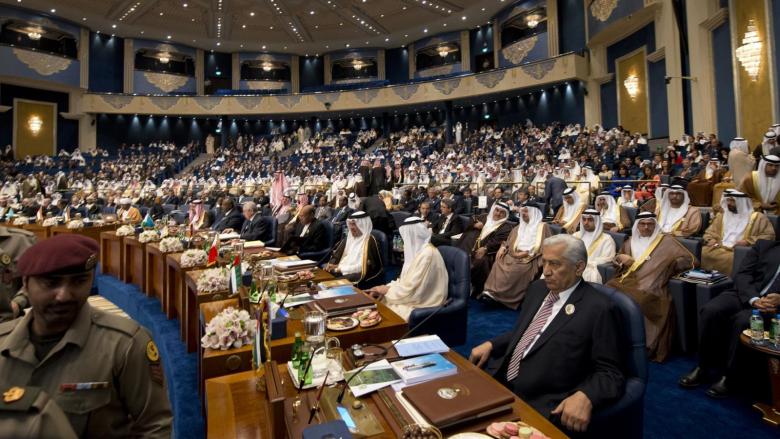This is the Middle East: Arabs, Persians, Turks and Kurds. But let’s put history aside to avoid the trap and analyze the present. By looking at the region’s map we realize that all wars are happening on Arab land that is being exploited by terrorists and militias, and is suffering from international meddling and sectarian conflict.
These are no exaggerations. Millions of old and new refugees are Arabs. Millions of displaced inside their countries are Arabs. So are the nations spread in camps that await aid.
Failed states in the region are Arab countries. The feeble countries that look like they have just come out of World War 2 are Arab as well. Millions of students who were deprived from schools are Arabs. The case is no different when it comes to wasted countries, fortunes and years.
These are no exaggerations. Persians are residing in their country that is trying to change contours of some neighboring countries. It is leading proxy wars and moving its militias to snatch their leaderships in the region.
Kurds who have always complained of historic and geographic injustice are now in a better condition for having a legitimate (Kurdistan) region on Iraqi territories and an army – which Americans and Russians are seeking to bring to their side – on Syrian territories.
In the region, only Arabs have a broken-wing.
Jordan seems as the ideal place to hold the post-catastrophes summit. This limited-resources country has received Palestinian refugees whose land was occupied by the Israelis. Later on, Jordan welcomed refugees from Iraq after the US invasion. It is also enduring the burden of Syrian refugees who are gazing from Jordan at the fire raging in their country.
Arab leaders know well the meaning of the Arab broken-wing in the region. Terrors can be seen by the naked idea and the summit is being held on a demarcation line. Israeli occupation is a monster that never sleeps. On the other fronts, there are many arms, militias, jets, interventions and flags.
Russia that has changed the war path in Syria is not distant from the summit as well as the US that is present in Mosul and Raqqa. There is only one candle in this darkness: ISIS defeat has begun.
The summit does not have a magic wand to treat critical diseases but it can send a message to reveal that Arabs are aware of the importance of regaining their voice and right in tackling their security, safety and rights. They also know they have the right to refuse the exploitation of Arab land through interferences, and to have a normal life like the rest of the region’s states.
The summit in Amman, in the best case, will succeed to remind Arabs that they can meet and reiterate some of their old principles. This has a major significance amid a new US administration and a major role played by Russia in the region.
In this context, the summit seeks returning the Palestinian cause as a top priority to urge Arabs to act against the Trump administration and to rescue the two-state solution that is being targeted daily by Israeli Prime Minister Benjamin Netanyahu.
On the Syrian file, the summit will highlight the political solution, legitimate international resolutions and the support for the Geneva process. However, an expert will realize a rising Arab tend to be more realistic and to accept the “Russian Syria” if this guarantees an upset to the plans of an “Iranian Syria”.
The summit is expected to focus again on rejecting Iranian meddling in Arab affairs and attempts to shake stability.
It would be beneficial if the summit sends a message to the key players that Arabs can be united on major issues that cause concern. It would also be beneficial to transform the summit into an opportunity on refreshing some inter-Arab relations that had relapsed. Fixing Arab ties needs a sense of reality, transparency and an agreement on long-term interests.
Arabs need an exceptional decision to restore their position in the region. This will not happen unless they take a historic decision to rescue their countries from failure, dissociation and stagnation. Consensual political formulas are not sufficient – it is also necessary to carry out a thorough revision of economic options because terrorism feeds on the poor, the unemployed and the hopeless.
The condition of the broken-wing Arabs needs a summit and a decision as serious as the threats. Arabs have the right to be equivalent to the Iranians and Turks. They should either take decisions or they will end up complaining over injustice just like the Kurds.
